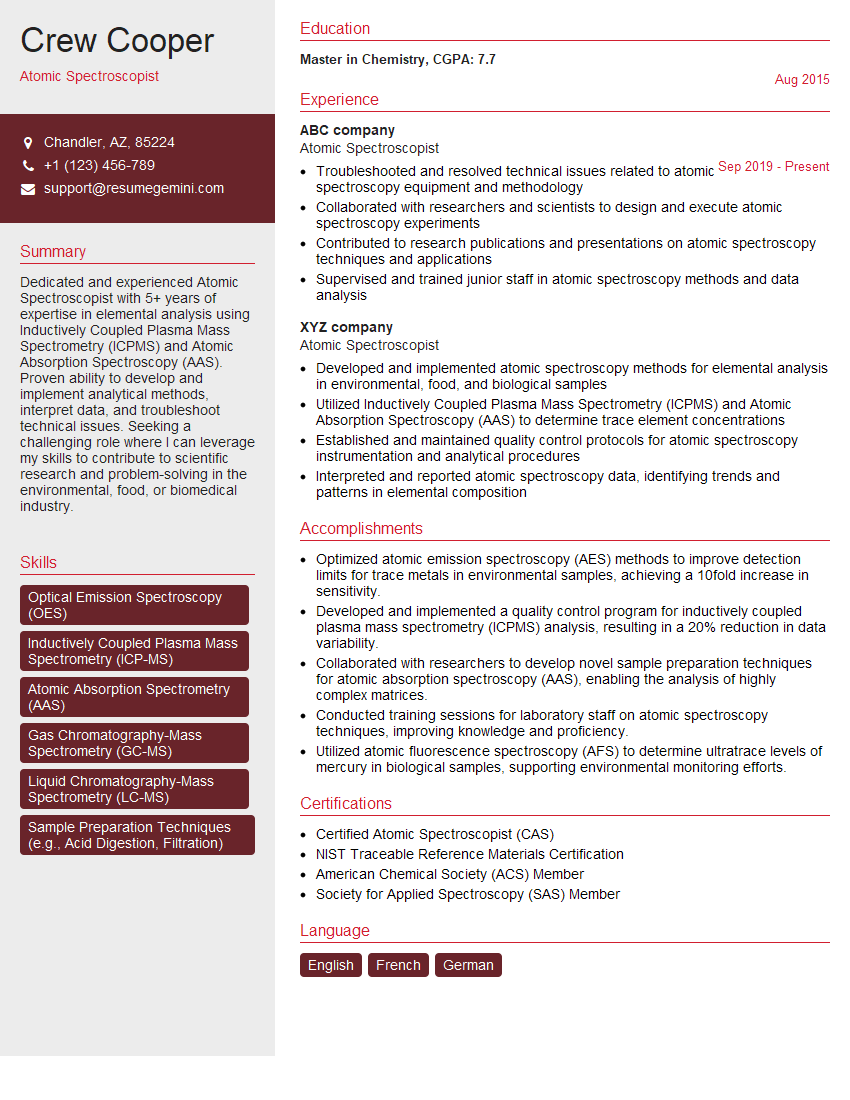Are you a seasoned Atomic Spectroscopist seeking a new career path? Discover our professionally built Atomic Spectroscopist Resume Template. This time-saving tool provides a solid foundation for your job search. Simply click “Edit Resume” to customize it with your unique experiences and achievements. Customize fonts and colors to match your personal style and increase your chances of landing your dream job. Explore more Resume Templates for additional options.

Crew Cooper
Atomic Spectroscopist
Summary
Dedicated and experienced Atomic Spectroscopist with 5+ years of expertise in elemental analysis using Inductively Coupled Plasma Mass Spectrometry (ICPMS) and Atomic Absorption Spectroscopy (AAS). Proven ability to develop and implement analytical methods, interpret data, and troubleshoot technical issues. Seeking a challenging role where I can leverage my skills to contribute to scientific research and problem-solving in the environmental, food, or biomedical industry.
Education
Master in Chemistry
August 2015
Skills
- Optical Emission Spectroscopy (OES)
- Inductively Coupled Plasma Mass Spectrometry (ICP-MS)
- Atomic Absorption Spectrometry (AAS)
- Gas Chromatography-Mass Spectrometry (GC-MS)
- Liquid Chromatography-Mass Spectrometry (LC-MS)
- Sample Preparation Techniques (e.g., Acid Digestion, Filtration)
Work Experience
Atomic Spectroscopist
- Troubleshooted and resolved technical issues related to atomic spectroscopy equipment and methodology
- Collaborated with researchers and scientists to design and execute atomic spectroscopy experiments
- Contributed to research publications and presentations on atomic spectroscopy techniques and applications
- Supervised and trained junior staff in atomic spectroscopy methods and data analysis
Atomic Spectroscopist
- Developed and implemented atomic spectroscopy methods for elemental analysis in environmental, food, and biological samples
- Utilized Inductively Coupled Plasma Mass Spectrometry (ICPMS) and Atomic Absorption Spectroscopy (AAS) to determine trace element concentrations
- Established and maintained quality control protocols for atomic spectroscopy instrumentation and analytical procedures
- Interpreted and reported atomic spectroscopy data, identifying trends and patterns in elemental composition
Accomplishments
- Optimized atomic emission spectroscopy (AES) methods to improve detection limits for trace metals in environmental samples, achieving a 10fold increase in sensitivity.
- Developed and implemented a quality control program for inductively coupled plasma mass spectrometry (ICPMS) analysis, resulting in a 20% reduction in data variability.
- Collaborated with researchers to develop novel sample preparation techniques for atomic absorption spectroscopy (AAS), enabling the analysis of highly complex matrices.
- Conducted training sessions for laboratory staff on atomic spectroscopy techniques, improving knowledge and proficiency.
- Utilized atomic fluorescence spectroscopy (AFS) to determine ultratrace levels of mercury in biological samples, supporting environmental monitoring efforts.
Certificates
- Certified Atomic Spectroscopist (CAS)
- NIST Traceable Reference Materials Certification
- American Chemical Society (ACS) Member
- Society for Applied Spectroscopy (SAS) Member
Languages
- English
- French
- German
Career Expert Tips:
- Select the ideal resume template to showcase your professional experience effectively.
- Master the art of resume writing to highlight your unique qualifications and achievements.
- Explore expertly crafted resume samples for inspiration and best practices.
- Build your best resume for free this new year with ResumeGemini. Enjoy exclusive discounts on ATS optimized resume templates.
How To Write Resume For Atomic Spectroscopist
Highlight your technical expertise:
Emphasize your proficiency in atomic spectroscopy techniques, including ICPMS, AAS, and sample preparation methods.Showcase your data analysis skills:
Demonstrate your ability to interpret complex data, identify trends, and draw meaningful conclusions.Quantify your accomplishments:
Use specific examples and metrics to quantify your contributions, such as the number of methods developed or samples analyzed.Tailor your resume to the job description:
Review the job description carefully and highlight the skills and experience that are most relevant to the position.Emphasize your problem-solving abilities
: Highlight your ability to troubleshoot and resolve technical issues related to atomic spectroscopy.
Essential Experience Highlights for a Strong Atomic Spectroscopist Resume
- Developed and implemented atomic spectroscopy methods for elemental analysis in environmental, food, and biological samples.
- Utilized Inductively Coupled Plasma Mass Spectrometry (ICPMS) and Atomic Absorption Spectroscopy (AAS) to determine trace element concentrations.
- Established and maintained quality control protocols for atomic spectroscopy instrumentation and analytical procedures.
- Interpreted and reported atomic spectroscopy data, identifying trends and patterns in elemental composition.
- Troubleshooted and resolved technical issues related to atomic spectroscopy equipment and methodology.
- Collaborated with researchers and scientists to design and execute atomic spectroscopy experiments.
- Supervised and trained junior staff in atomic spectroscopy methods and data analysis.
Frequently Asked Questions (FAQ’s) For Atomic Spectroscopist
What is the role of an Atomic Spectroscopist?
An Atomic Spectroscopist is responsible for analyzing the elemental composition of materials using atomic spectroscopy techniques, such as Inductively Coupled Plasma Mass Spectrometry (ICPMS) and Atomic Absorption Spectroscopy (AAS). They develop and implement analytical methods, interpret data, and provide insights into the elemental composition of samples.
What are the key skills required for an Atomic Spectroscopist?
Key skills for an Atomic Spectroscopist include expertise in ICPMS, AAS, and other atomic spectroscopy techniques, as well as proficiency in sample preparation, data analysis, and troubleshooting. Strong communication and teamwork skills are also essential.
What industries employ Atomic Spectroscopists?
Atomic Spectroscopists are employed in various industries, including environmental monitoring, food safety, pharmaceutical manufacturing, and materials science. They play a crucial role in ensuring the quality and safety of products and the environment.
What is the career outlook for Atomic Spectroscopists?
The career outlook for Atomic Spectroscopists is positive due to the increasing demand for elemental analysis in various industries. As industries prioritize quality control and environmental sustainability, the need for skilled professionals in atomic spectroscopy is expected to grow.
What are the educational qualifications required to become an Atomic Spectroscopist?
Typically, Atomic Spectroscopists hold a Master’s or Doctorate degree in Chemistry, Analytical Chemistry, or a related field. Strong academic performance and research experience in atomic spectroscopy are highly valued.
What are the professional development opportunities available for Atomic Spectroscopists?
Atomic Spectroscopists can pursue professional development through conferences, workshops, and online courses offered by professional organizations such as the Society for Applied Spectroscopy (SAS). Staying updated with the latest advancements in atomic spectroscopy techniques and applications is crucial for career growth.